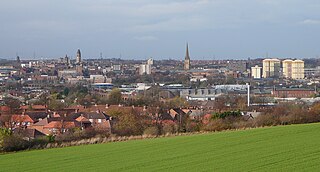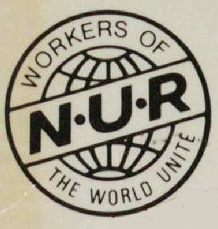Leonard Sharp MBE (30 January 1902 [1] – 27 June 1972) was a British trade unionist.

The British people, or the Britons, are the citizens of the United Kingdom of Great Britain and Northern Ireland, the British Overseas Territories, and the Crown dependencies. British nationality law governs modern British citizenship and nationality, which can be acquired, for instance, by descent from British nationals. When used in a historical context, "British" or "Britons" can refer to the Celtic Britons, the indigenous inhabitants of Great Britain and Brittany, whose surviving members are the modern Welsh people, Cornish people, and Bretons. It may also refer to citizens of the former British Empire.
Born in Wakefield, then in the West Riding of Yorkshire, [2] Sharp undertook a number of jobs, and was a keen trade unionist, joining first the National Union of Railwaymen, then the National Union of General Workers. [3] In 1920, he began working in the textile industry, and joined the Amalgamated Society of Dyers, Finishers and Kindred Trades. [2]

Wakefield is a cathedral city in West Yorkshire, England, on the River Calder and the eastern edge of the Pennines, which had a population of 99,251 at the 2011 census.

The West Riding of Yorkshire is one of the three historic subdivisions of Yorkshire, England. From 1889 to 1974 the administrative county, County of York, West Riding, was based closely on the historic boundaries. The lieutenancy at that time included the City of York and as such was named West Riding of the County of York and the County of the City of York.

The National Union of Railwaymen was a trade union of railway workers in the United Kingdom. The largest railway workers' union in the country, it was influential in the national trade union movement.
The Amalgamated Society became part of the National Union of Dyers, Bleachers and Textile Workers (NUDBTW) in 1936, and Sharp gradually rose to prominence, initially through his activities on local trades councils, serving as president of both the Wakefield and Huddersfield councils. In 1955, he was elected as assistant general secretary of the NUDBTW then, two years later, as general secretary. Also in 1957, he was elected to the General Council of the Trades Union Congress and, through this, became involved with the International Labour Organization, serving as the adviser to the British Workers' Delegate. [2]

The National Union of Dyers, Bleachers and Textile Workers (NUDBTW) was a trade union in the United Kingdom.

Huddersfield is a large market and university town in West Yorkshire, England. It is the 11th largest town in the United Kingdom, with a population of 162,949 at the 2011 census. It lies 14 miles (23 km) southwest of Leeds and 24 miles (39 km) northeast of Manchester.
The General Council of the Trades Union Congress is an elected body which is responsible for carrying out the policies agreed at the annual British Trade Union Congresses (TUC).
Sharp retired in 1966, and was made a Member of the Order of the British Empire. [2]



